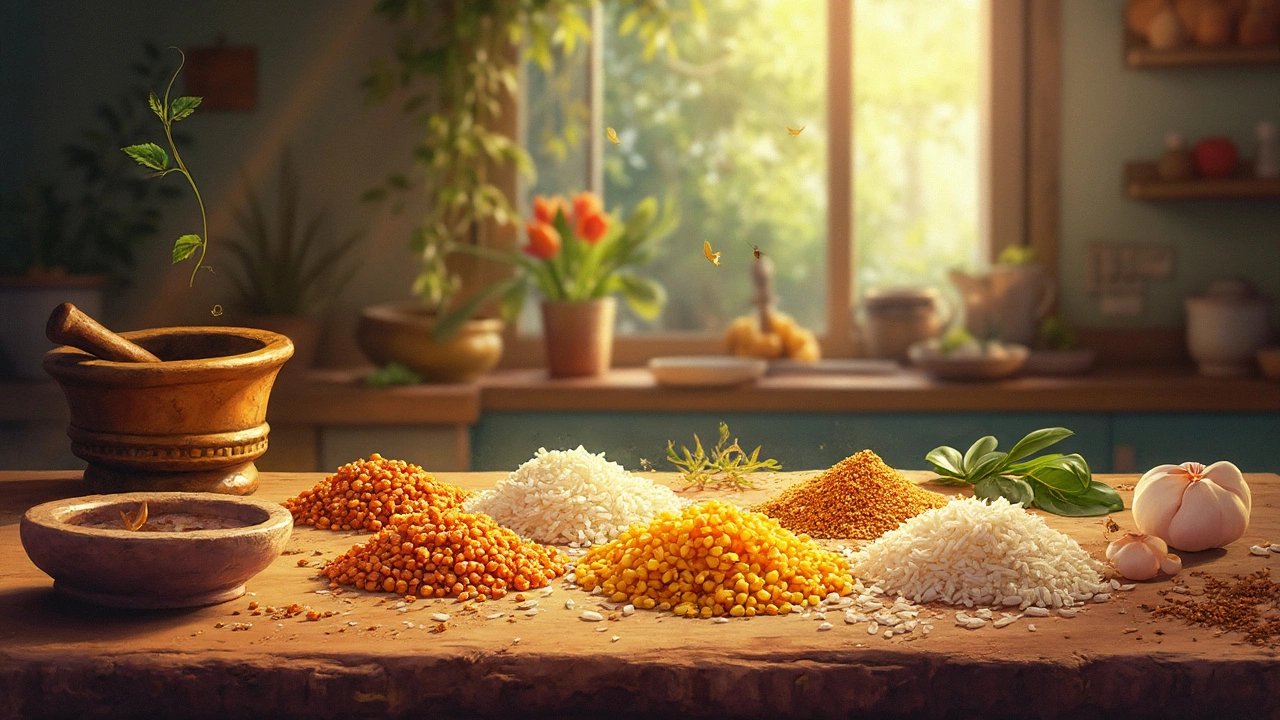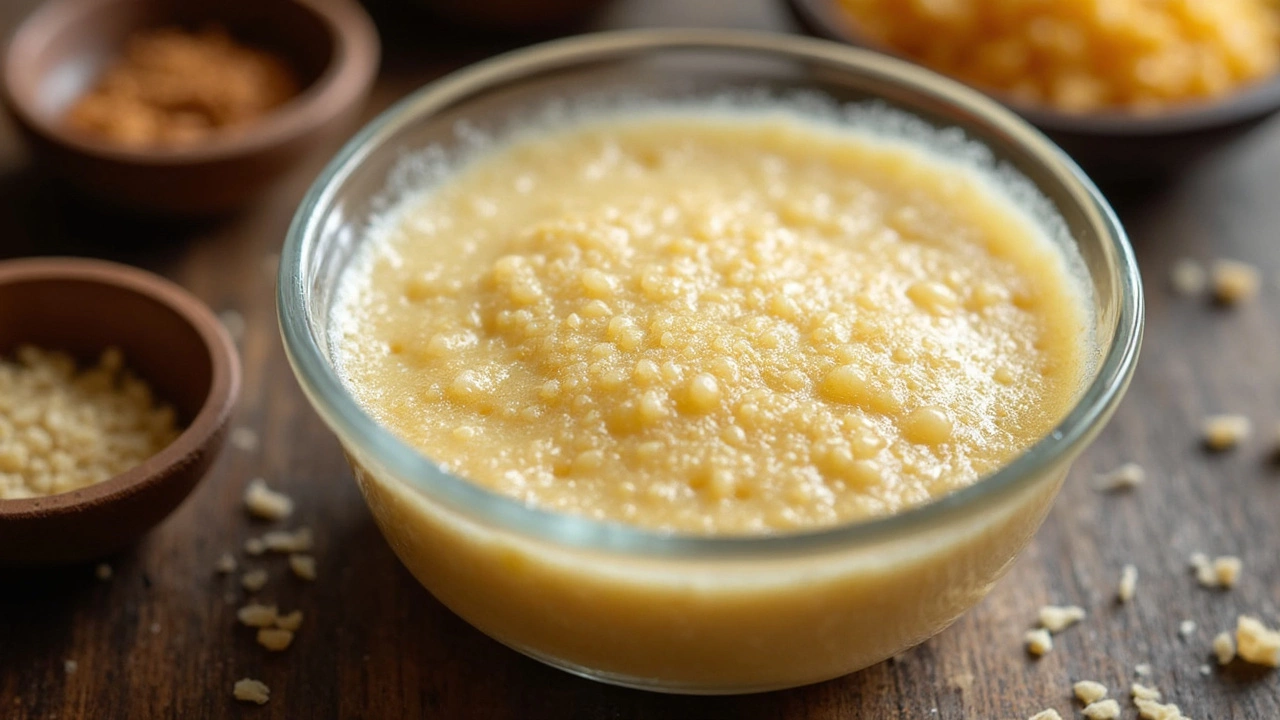Boost Dosa Batter Fermentation With Simple Ingredients
 Feb, 11 2025
Feb, 11 2025
We've all had those days when we're excited to make dosas but the batter just won't cooperate. Waiting for it to ferment can feel like an eternity, right? Fortunately, there are natural ways to speed things up a bit. And the best part? You don't need anything fancy! Just some simple ingredients lying around in your kitchen can do wonders.
Temperature is a big player here. Dosa batter loves warmth, but not too much. Think of it like a cozy blanket—enough to keep it comfortable and active, but not so hot that it gets too cozy and stalls. If your kitchen is chilly, you could put the batter near your oven or any warm spot in your house.
But besides temperature, there are clever little additions that can help. Take fenugreek seeds, for example. Adding a small amount when grinding your rice and dal can kickstart the fermentation process. Why? These seeds are not only good for flavor but they boost fermentation enzymes—a nifty little secret from grandmothers!
- Understanding Dosa Batter Fermentation
- Leveraging Temperature and Environment
- Using Natural Additives
- Practical Tips for Better Results
Understanding Dosa Batter Fermentation
Dosa batter fermentation might sound like a simple kitchen task, but it's actually a fascinating process that brings together science and tradition. When you're making dosa, understanding how to get your batter to ferment properly can mean the difference between a chewy disappointment and a crispy, delightful dosa.
Fermentation is basically the process of letting friendly bacteria, usually from your ingredients and environment, munch on the starches and sugars in the batter. As they do their thing, they produce carbon dioxide, and that's what causes the batter to rise. This magical process not only adds a bit of fluffiness to the batter but also gives it that signature tangy taste we all love.
Ideal Conditions for Fermentation
For the **dosa batter** to ferment effectively, it needs the right environmental conditions. Ideal temperatures range between 25°C to 30°C. Anything below this, and it might take forever to ferment. Anything above, and you're probably overcooking it before it even hits the pan!
Ingredients Matter
Your choice of ingredients can also influence fermentation. Use high-quality urad dal and rice, ensuring they're fresh. Old or low-grade ingredients often lack the natural bacteria needed for fermentation. By maintaining a one-to-three ratio of dal to rice, you help create an environment conducive to better fermentation.
Some folks add a pinch of sugar to kickstart fermentation—sugar acts like a quick snack for bacteria, giving them an initial boost. But don't go heavy-handed with it; just a pinch is enough.
The presence of fenugreek seeds, a key ingredient in some recipes, acts as a natural aid. These tiny seeds have their own enzymes popping that can accelerate fermentation. Who knew such small seeds could wield such power, huh?
Timing is Key
Patience plays a big role. Typically, fermentation takes anywhere from 8 to 12 hours, but this can vary based on temperature and the quality of your ingredients. Watching the clock, especially on colder days, is crucial. You don't want to wait too long, as over-fermented batter can make dosas taste sour.
By understanding these factors, you’re well on your way to mastering the art of perfect dosa making. It's all about finding that balance and working with nature to create something truly delicious.
Leveraging Temperature and Environment
Ever noticed how some days your dosa batter ferments faster than others? That's largely due to temperature and environment. It's all about creating a warm and cozy setting to get those microorganisms working their magic on your batter.
Ideal Temperature
The sweet spot for fermentation is around 30-32°C (86-89.6°F). If your kitchen naturally hits these temperatures, you're in luck! Keeping the batter near warm appliances like ovens or inside a pre-warmed, switched-off oven can help when it’s cooler. Just avoid direct sun as it might overheat and spoil the batter.
Humidity Matters
Humidity can play a role too. Higher humidity accelerates fermentation, so think about placing a damp cloth over your vessel. It keeps the environment moist, helping the good bacteria thrive.
Avoiding Cold Drafts
Much like how we pull on a sweater in a cold draft, you want to protect your dosa batter from any chills. Cover it with a lid but not airtight—leave a little room for the air which aids the fermentation process. And try not to open the lid too often; let those little microbes work without interruption!
Using a Preheated Oven
One handy trick is to preheat your oven to the lowest setting for about 10 minutes, turn it off, and then place the batter inside. This keeps the batter warm enough for hours without overheating. Sounds neat, right? Just remember to keep the oven light on for an extra boost in warmth.
Thought a kitchen hack like garbage bags could help? Some folks wrap their batter in a clean black bag to trap heat. These little tricks can make your life easier and bring those dosa dreams closer to reality faster!

Using Natural Additives
Looking to give that dosa batter a helpful nudge? You'd be surprised at how a few natural ingredients can make a world of difference. Let's dive into some handy additions that can help speed up the fermentation process.
Fenugreek Seeds
Fenugreek seeds are a tiny powerhouse when it comes to aiding fermentation. Just toss in about a teaspoon when grinding your rice and dal. They are known to enhance the microbial activity, which leads to quicker and better results.
Poha (Flattened Rice)
Adding a handful of poha can really amp up your dosa batter. It dissolves easily, floats in the batter, and makes it fluffier. The tiny starch molecules help kickstart the fermenting process much faster.
Cooked Rice
A couple of tablespoons of cooked rice can be a lifesaver if you're pressed for time. It supports the fermentation by creating a friendly environment for the yeast and bacteria.
- Wash and soak a small batch overnight.
- Grind it with your usual rice-dal mix.
Sugar
A spoonful of sugar can sometimes do the trick! Not only does it lend a hand in the process, but it also gives a slight sweet undertone to your dosas.
These tricks aren't just hearsay—home cooks swear by them. Why not experiment by mixing and matching these natural ingredients next time you prepare your batter?
Practical Tips for Better Results
Getting that perfect dosa batter consistently can be a bit of a juggle, but there are some foolproof ways to tilt the odds in your favor. Let's break down a few tips that can make a big difference.
Use Quality Ingredients
The base of any good dosa is the rice and urad dal. Ensure you're using fresh, good quality ones. Old or poor-quality ingredients might affect the fermentation process and, in turn, the taste and texture.
Blend It Well
When grinding the rice and dal, aim for a slightly coarse texture. It shouldn't be too smooth or too gritty. A good rule of thumb is to grind to a sand-like consistency. While blending, use cold water which helps keep the batter from heating up, ensuring a better ferment.
Optimal Fermentation Environment
Even if the weather isn't on your side, you can create a warm environment. Try placing your batter in a pre-warmed oven (just warm it up a bit and switch it off). Alternatively, you can wrap a towel around the container. This cozy setup keeps the batter's microbial friends active.
- Avoid placing the batter in areas where there's a risk of temperature fluctuation.
- If the climate is too hot, fermentation can go overboard, so keep an eye on it.
Stir It Up
Give your batter a gentle stir after 4-5 hours. This evenly distributes the existing yeast and allows fermentation to happen uniformly. Plus, it provides a fresh dose of oxygen to the mix.
Natural Add-ons
Add a splash of sour curd or a pinch of baking soda before setting the batter aside. These kitchen staples can give your dosa batter that extra nudge. Remember, moderation is key, as too much can impact the taste.
By following these tips, you're setting yourself up for consistent dosa-making success. Remember, every ingredient and action counts towards that perfect, crispy dosa!